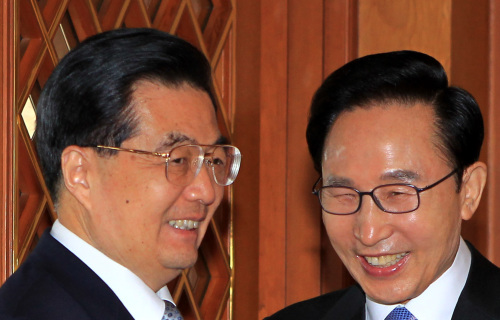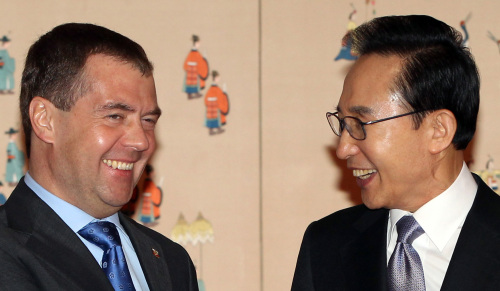Hu, Medvedev urge Pyongyang to improve people’s livelihoods first
In a rare show of unity, South Korea, China and Russia on Monday urged Pyongyang to scrap its plan to launch a long-range rocket and focus instead on improving the livelihoods of its people.
Chinese President Hu Jintao expressed “deep concerns” over the launch plan, saying Beijing had already called on it to give up the plan during his summit talks with President Lee Myung-bak at Cheong Wa Dae, Lee’s aide for external strategies Kim Tae-hyo told reporters.

President Lee Myung-bak greets his Chinese counterpart Hu Jintao before their summit talks at Cheong Wa Dae on Monday. (Yonhap News)

Lee meets Russian President Dmitry Medvedev (Yonhap News)
Lee and Hu also shared the view that the rocket launch would negatively affect peace and stability on the Korean Peninsula and the resumption of multilateral denuclearization talks.
Earlier this month, the North announced it would launch a satellite to mark the centennial birthday of its late founder Kim Il-sung, falling on April 15. Experts here say it is a cover for testing the Taepodong-2 ballistic missile.
Russian President Dmitry Medvedev echoed Hu’s view during his talks with Lee later in the day, stressing Pyongyang should feed its people first and change for economic development rather than continuing to rely on international aid, according to Kim.
Calling the launch plan “undesirable,” Medvedev said Moscow had conveyed to the North its “firm resolve” against the launch before heading for Seoul to attend the two-day Nuclear Security Summit that began on Monday.
Their summit talks with Lee came a day after U.S. President Barack Obama warned that the rocket launch would result in further isolation, stressing that Pyongyang would not be rewarded for “bad behavior.”
Obama, Hu, Medvedev and other leaders of some 50 countries and four international organizations are here to attend the premier forum on anti-nuclear terrorism.
During their bilateral meeting, Lee and Hu also agreed to cooperate more closely to address thorny bilateral issues such as the North Korean defectors in China and the demarcation of their maritime boundaries.
Regarding the defectors, the two leaders agreed that the countries would handle the issue in accordance with humanitarian principles and through close cooperation while trying to understand each other’s positions.
The issue has been thrust back into the spotlight by public calls for Beijing to stop the forcible repatriation of North Korean defectors in the country. North Korea recently warned of tougher punishments for those caught fleeing the regime.
China has so far refused to regard them as refugees, maintaining that they are “economic migrants” that crossed the border illegally.
The two leaders also agreed to seek the early start of negotiations over their maritime boundaries, in an apparent effort to settle the issue of the jurisdictional claim to Ieodo, a submerged rock within the overlapping exclusive economic zones of the two countries.
The two leaders also agreed to seek the early declaration of their official negotiations over the bilateral free trade agreement. Seoul has completed a significant part of the domestic procedures needed to initiate the negotiations.
By May, at the latest, Seoul will hold a meeting of related ministers to deliberate the envisioned FTA and hold a meeting of trade ministers from both nations, after which Seoul will wrap up preliminary procedures for the negotiations, Kim explained.
During the talks between Lee and Medvedev, they agreed to expand their cooperation in trade, business and the defense industry on the occasion of Russia’s entry into the World Trade Organization in December.
Meanwhile, after the bilateral meeting between Lee and Turkish Prime Minister Recep Tayyip Erdogan, the two countries signed a tentative agreement on trade as part of a free trade pact they have been seeking to conclude in the first half of the year.
Erdogan also expressed hopes to enhance cooperation in the energy, defense, automobile and shipbuilding industries and other areas.
During summit talks between Lee and Chilean President Sebastian Pinera, the two leaders agreed to expand bilateral cooperation in energy and resources, infrastructure, and renewable energy and environmental industries, Cheong Wa Dae said.
The two leaders agreed to further deepen their cooperative ties as this year marks their 50th anniversary of diplomatic relations.
In a summit meeting with Kazakh President Nursultan Nazarbayev, the two leaders agreed to continue to cooperate closely to ensure various economic projects between the two countries move forward smoothly, the presidential office said.
For this, the two leaders agreed to conclude a temporary labor pact at an early date that will help South Korean people to do business in the Central Asian nation under fewer restrictions, the office said in a statement. The two nations also signed an agreement on a joint project to minimize the loss of electricity in the process of transmission and distribution in Kazakhstan.
On the day, Lee also had bilateral talks with Crown Prince of Abu Dhabi Sheikh Mohamed bin Zayed Al Nahyan over ways to deepen their friendly ties.
The two leaders discussed their recent deal over the development of oil fields in Abu Dhabi and agreed to spur bilateral cooperation in the construction of nuclear reactors in the UAE.
In December 2009, Korea Electric Power Corp. and Emirates Nuclear Energy Corp. signed a $20 billion deal to build four nuclear reactors by 2020.
By Song Sang-ho (
sshluck@heraldcorp.com)







![[Graphic News] More Koreans say they plan long-distance trips this year](http://res.heraldm.com/phpwas/restmb_idxmake.php?idx=645&simg=/content/image/2024/04/17/20240417050828_0.gif&u=)